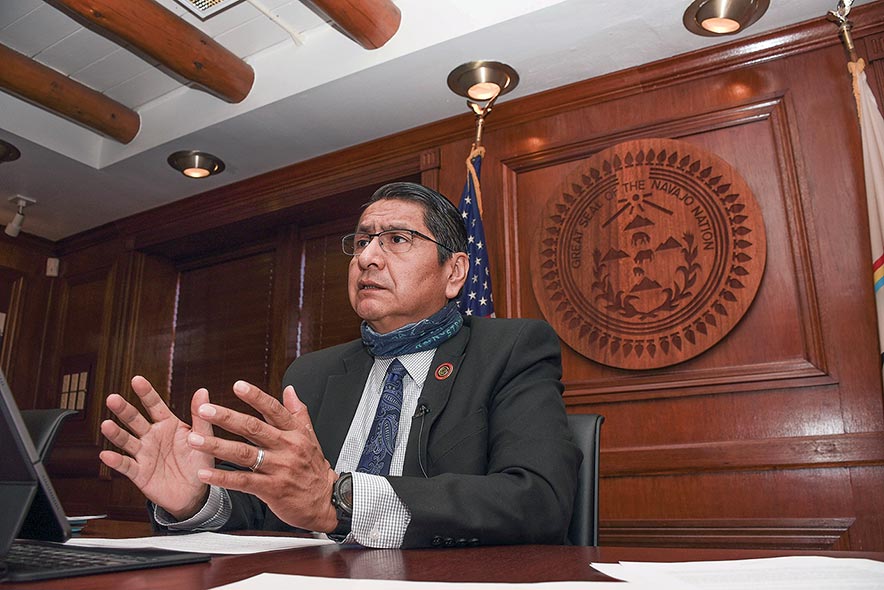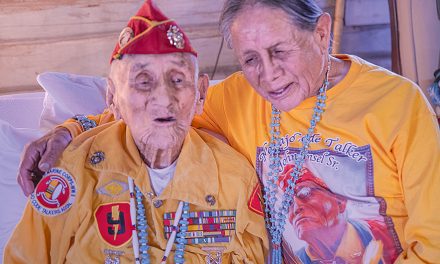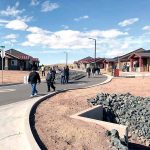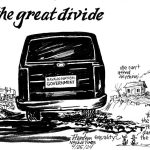
Are Diné ready for ‘alcohol and marijuana’?

Navajo Times | Krista Allen
Navajo Nation President Jonathan Nez speaks in front of an iPhone camera during a virtual town hall, which was streamed live on his Facebook page and on YouTube, at his office in Window Rock Tuesday morning.
Part 2 of 2
TSÉBIGHÁHOODZÁNÍ
From the promise of a COVID-19 vaccine to the belief that the world would return to “normal,” 2021 proved to be a tumultuous year for President Jonathan Nez.
The vaccine saved some lives in Diné Bikéyah but hopes and fears did their usual work to create a year that was anything but unruffled, leaving many to wonder when the pandemic will ever end.
While COVID-19’s waves of destruction have inflicted their own despair on Diné, Nez said he had to rewrite the leadership playbook and try to keep the Navajo Nation afloat.
It wasn’t burnout for Nez because he has energy. It wasn’t depression because he didn’t feel hopeless for the Nation.
He says it was swift action, compassion, and trust in science. And he was tested as a president – sometimes falling short and sometimes rising to the moment.
“I believe it’ll make us stronger,” Nez said.
Like other cultures, some Diné use their family and friends as a stress buffer and talk about problems instead of seeking negative coping mechanisms such as drinking alcohol and doing drugs.
Nez said many Diné couldn’t use their stress buffers because of COVID-19 precautions and procedures.
“Every single person on Navajo was affected in one way or another by this pandemic,” he said. “You don’t read the statistics this way. We just see (numbers) on a piece of paper.”
Nez said he didn’t take a class on how to respond to a global pandemic. Instead, he acted calmly and demonstrated resolve, courage, and empathy for his people, knowing some would fall prey to the virus.
Nez said he didn’t think much about his own family and what they went through because he was focused on the Nation.
“We were so focused on the Navajo people,” he said in response to a question about how he personally dealt with the pandemic’s mental toll and uncertainty. “I’m sure it’ll hit me soon.”
Tough questions, transparency?
The Navajo Times met with Nez at his office for an hour-and-a-half to cover questions ranging from the political year ahead and 2% tax on calorie-dense food and drinks to restructuring the Navajo Nation Council and the biggest imports and exports in Diné Bikéyah.
Here are the questions.
Election season is approaching. Is Vice President Myron Lizer, Nez’s campaign sidekick in 2018, leaving the Cabinet on the re-election ticket?
Nez didn’t quite answer the question, but he said his team is going to finish until the end.
Nez said his administration was established through prayer and if someone in his team wants to leave, he’ll respect their decision.
“We built a cabinet,” Nez said. “When I won the election (nearly) four years ago, there was a lot of prayer done … (about who would be the cabinet selections).”
Lawmakers in January 2021 reauthorized a 2% sales tax on calorie-dense food and drinks purchased at retail stores across Diné Bikéyah. Nez has said the reauthorization has no provision to end the 2% sales tax, and that the Nation would be using the dollars to address health deficiencies in communities. What has been the result?
Nez said there has been a decrease in diabetes and cardiovascular disease not only in Diné Bikéyah but also across Indian Country. He thinks the reason for the decrease is because many Diné decided to change their lifestyle toward diabetes prevention such as losing weight and being physically active.
“Sales tax was utilized for (building trails and wellness centers) for that purpose,” Nez said. “During the pandemic, communities were fixing some of their community cornfields with these dollars; to plant healthy Navajo foods.”
Nez named only three projects on which some of the sales tax was used: one trail in Ts’ahbiikin and another in Crownpoint, and the Just Move It campaign.
Nez did not confirm how he knows diabetes cases have declined in the Nation, but he said the Nation was reauthorized Special Diabetes Program for Indians.
Because you promoted “Buy Navajo, Buy Local,” how does the 2% sales tax increase on calorie-dense food and drinks affect Navajo businesses?
Nez said the 2% sales tax is specifically for healthy living.
“Since we (his administration) encouraged people to stay home more, I think everybody recognized the safest place to be is on the Navajo Nation,” Nez said. “And it still is. But I do understand that people do have to leave the Navajo Nation to buy goods because there’s no store close by.”
Nez said because Diné stayed home during the pandemic, it also means the sales tax became greater and went into a coffer of general fund to help with projects.
To test his emotional intelligence, the Times asked how important Navajo sovereignty is.
Nez said it’s important because it is the concept of t’áá hwó ájít’éego.
“When you say that, then inherent sovereignty (the most basic principle of all Indian law) comes in,” Nez said. “That starts in the home where the fire poker is, where the water is, where the family resides.
“That’s inherent sovereignty,” he said. “Then we delegate it to leaders like (me) and the Council through a vote and say it’s ‘delegated-governance’ or ‘representative governance,’ meaning some delegates you’ll hear on the floor.”
Nez added that sovereignty means t’áá hwó ájít’éego and for a Nation to take care of itself.
“But as a Nation, we’re regaining that,” he said. “That’s true sovereignty.”
Does this change increase or decrease sovereignty?
Nez said sovereignty is there and it just depends on how one uses that ability. And if one doesn’t use that ability to govern themselves, then it decreases.
But taking a bull by the horns is different as it legitimizes the people.
“Look at Navajo,” Nez said. “We have a competent court system. We have a Council that makes laws and then on the executive side, we use what we have and make sure services are provided for our Navajo people. It’s not going to help everybody but those … in need are able to get assistance.”
In March 2021, the Nez administration issued letters to the Arizona Senate and to Gov. Doug Ducey’s office outlining the Nation’s opposition to Senate Bill 1653, which would have created a new state county. Nez has said the bill would have isolated the Navajo and Hopi nations into one county. What happened to this bill?
Nez said the bill simply “went away” and “it’s dead.” He said this isn’t the first time this bill was introduced.
“There’s a perception from the (Arizona) state that Navajos and Indigenous nations do not take property tax,” Nez said. “Why are we utilizing that resource on Navajo? So, when you say we’re not paying taxes, it’s a myth.
“I know that some people don’t like to be governed by (Natives),” he said. “When you try to change counties, you can take it as discrimination and that’s how we took it.”
The Navajo Police Department conducts sobriety checks to deter alcohol-related incidences and DUI crashes. These checks sometimes result in confiscation of alcohol and drugs. What else gets through? Why doesn’t the Nation have the alcohol conversation? Why can’t Diné buy alcohol and take it home? And there are treatment centers everywhere but hardly any on the Nation.
Nez said the law of the land suggests that alcohol is prohibited in the Navajo Nation. This means the sale of alcohol is also prohibited unless it’s at one of the Nation’s casinos.
“That’s the law,” Nez said. “Until that law’s changed, that’s the ban on that type of substance. Of course, the (state) legislature would have to consider that.”
Nez said Diné would have a say in a decision like that.
“Are the Navajo people ready to have alcohol on the Navajo Nation?” Nez asked. “That’s going to be a big debate. Of course, there will be dollars that would come from the sale of alcohol – an alcohol tax.”
Nez didn’t say if the alcohol tax would go toward establishing alcohol rehab and detox centers in the Nation.
“Look at what happened with the hemp (Dineh Benally’s hemp farm), there was … a big public push to (prevent) it to happen on Navajo,” he said. “We are a Democrat-majority here on Navajo, but we still have those conservative values that are still embedded in our people, and one of those (are) substances.
“Alcohol and marijuana, are the Navajo people ready for that?”
Nez added that the fiscal 2022 budget includes funds to reestablish a drug and alcohol task force to catch bootleggers and drug dealers, and funding to reinstate a highway safety program under the Division of Public Safety.
“We are proposing treatment centers to be built,” he said. “Alcohol use in the future could lessen.”
The Diné authorized gaming, why not alcohol? Why not marijuana? Marijuana legalization is sweeping the U.S.
Nez said he’s open to the Diné deciding on a lot of things such as increasing the 24-member Council to 44, governing body/language, and alcohol and marijuana.
Do you see anything wrong with Edison Wauneka’s initiative to increase the 24-member Council to 44? And with all the needs in the Nation, are the people really asking for restructuring of the Council?
Nez said precedents were set that Wauneka’s “referendum” is a “petition initiative” and it’s a concern.
Nez said the Council delegates garnered signatures to place that reduction on the ballot, including the line-item veto.
“It went from a petition to the people,” he said. “The same process should be utilized: go out there and get signatures and put it on the ballot.”
The Council though already ruled on the initiative election in 2010 saying it was “proper and valid.”
Council is too busy trying to become a 44-member. For what? Nothing has changed since the 70s, except the Nation has a three-branch government even though the judicial branch has functioned as a branch long before Title II.
Nez said he gets comments about the 44-member idea. He said some people say an increase in delegates could be OK since they don’t see much of them in their communities.
And some say they already voted on the initiative, but it’s also time to “reevaluate” the chapter system.
“And it’s just a few, talking with constituents,” Nez said. “And I believe that they’ve spoken.”
If restructuring of the Council passes, would you support Council having a referendum to eliminate or change the line-item veto?
Nez said it needs to be a petition.
“That’s how the process was set up,” he said. “They went out to the people, they got signatures, and it got on the ballot. Now, it’s a different process. It could be challenged. I could be held liable for that if I do agree with it because it’s disenfranchising citizens out there.”
Nez said there was a lot of questions when this came up at the Council.
“We’ll wait,” he said. “Those legal analyses we haven’t received from either legislative counsel or our own attorney general as well. We protect the voting rights, the rights of our people. Now, if we disenfranchise that, it’s a different story.”
What are the biggest imports and exports in the Nation?
Some of the imports and exports are alcohol, groceries, and vehicles.
Nez said, “We export coal, food from NAPI, we also export our human resources to other tribes. A lot of our Navajo people are working in other places that are helping out on their nations.”
Nez said what the Nation wants to import is bringing some of those Diné working citizens back home to help “nation-building.”
He said, “We’re such a young government. That government was set up not on our terms. The federal government placed the Council, this type of executive leadership on us, but throughout the decades, we’ve been able to make it our own.
“One of those examples is 88-member Council to 24,” he said. “The Navajo people took it upon themselves to reduce the Council, giving line-item veto authority to the president because of misappropriation of dollars.”
In terms of services, Nez said the Nation exports knowledge to tribal governments as people work all over the world.
In the long run, he said, the Nation could bring in companies and other creative factories such as the glove manufacturing facility.








 Highway 264,
Highway 264, I-40, WB @ Winslow
I-40, WB @ Winslow